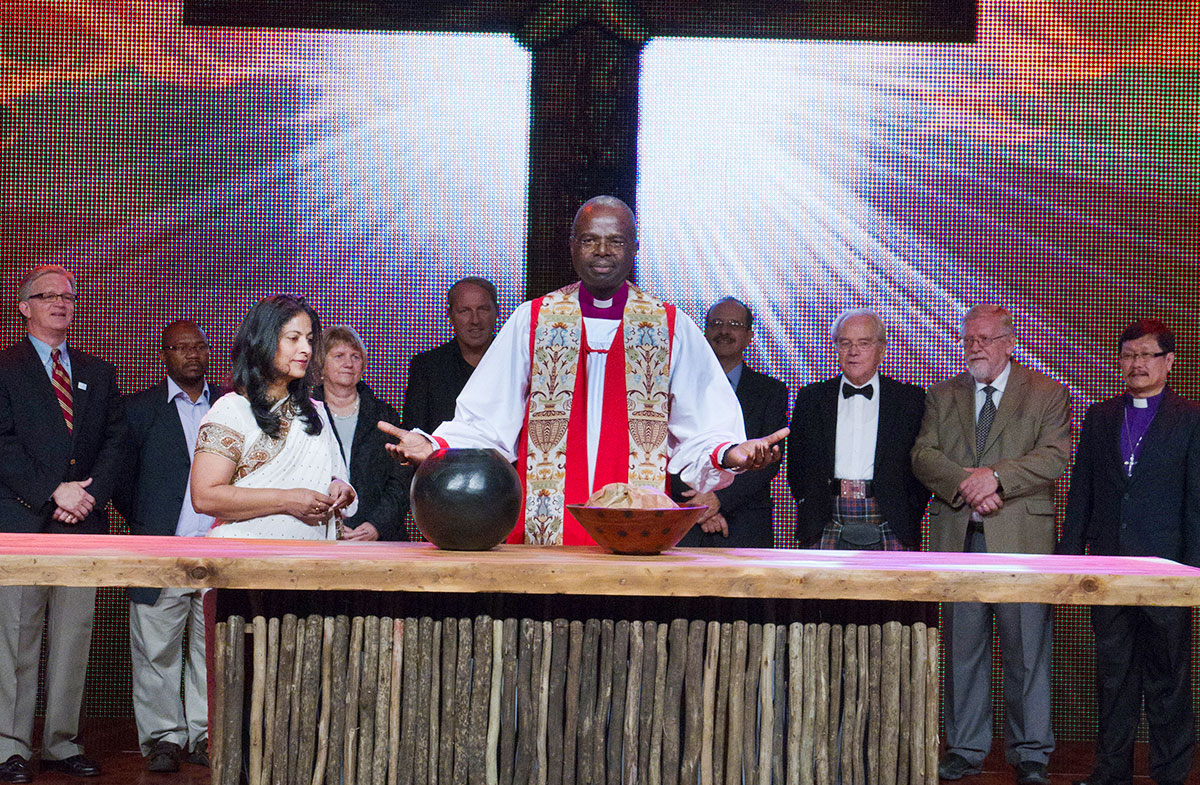I. Cape Town 2010 — An Enduring Impact
The Third Lausanne Congress on World Evangelization in 2010, which gathered over 4,200 people in Cape Town, South Africa, and an estimated 100,000 additional viewers at over 650 Global Link sites, cost about 20 million USD. Was it worth it?
According to David Wills, former president of the National Christian Foundation, and Rob Martin, First Fruit, Inc. board member, it was worth every dollar. They recently estimated that Cape Town 2010 increased giving to global missions by 100 million USD per year for the last ten years, for a total of 1 billion USD. That’s a return on investment of 50 to 1, or a net of 980 million USD for missions.
Incredible as this is, the biggest benefit has not been the financial return on investment—rather, Cape Town 2010’s enduring and continuing legacy is the kingdom return of saved souls, disciples made, and leaders trained. Cape Town 2010 has led to uncountable changes of perspective and attitude, the sharing of best practices across geographic boundaries, and the intersection of multiple disciplines to uncover innovative solutions.
While we will never know the full impact of Cape Town 2010, much can be learned through surveys with open-ended questions. In October 2020—the 10th anniversary of the congress—Lausanne conducted a survey among Cape Town participants. Over 500 comments and stories were shared, with more than 99% expressing positive benefits ten years later for having attended Cape Town 2010.
The remainder of this document is a report on the results of that survey, and some of the reunion calls that took place last year.

II. Individual Impact
‘A mosaic of cultures, peoples, and languages [. . .] a peek of what the book of Revelation describes as every people, tongue, and tribe worshipping Jesus the Lamb of God.’

Survey statement: ‘What I learned at Cape Town 2010 made an impact on my life and ministry.’ 96% of responders agreed (36%) or strongly agreed (60%) with this statement.
Many Cape Town 2010 participants were personally convicted through the gathering to launch new ministries and missionary efforts in areas all around the world.
New evangelistic outreaches were established among the Marwari people (an indigenous Hindu tribe), where over 100 house churches have been established in the past ten years, and among the Fulani people of sub-Saharan Africa, where Muslim community outreach and audio Bible ministry have flourished.
One participant went on to found Global Link Afrika, a mission mobilization ministry working to send missionaries from local churches in Uganda, and another participant founded Women in the Window International, which has since equipped and empowered hundreds of women leaders in Africa, Asia, and the Middle East. In Ethiopia, Cape Town 2010 sparked a new era of missionary sending, and today a significant number of Ethiopian missionaries serve outside the country.
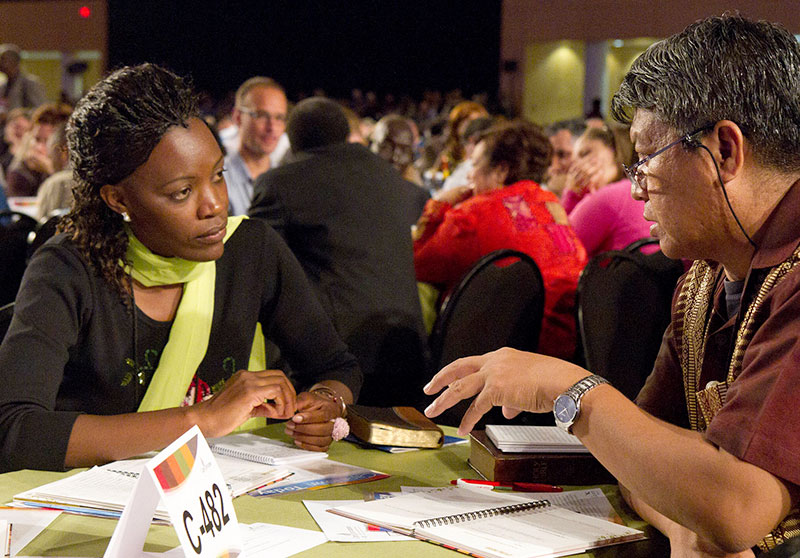
New Missions in the Romanian Church
‘I was deeply motivated to get involved in mobilizing the church. Therefore, I started to simply mobilize for mission in Romania and for Romanians dispersed throughout Europe. Looking back, I see hundreds of churches taking on the great commission, thousands of believers who realized the importance of mission, and hundreds of young people enlisted in short-term mission or dedicated to long-term ministry.’
Existing Mission, New Ministry
‘I participated in Cape Town 2010 as the President of the Ghana Evangelical Missions Association and have since been more active in getting the national missions movement to drive the Unreached People Groups agenda.’

III. Meaningful Connections
‘Cape Town helped to lay foundations for more harmony and mutual respect among various missionaries working with different ministry philosophies among Muslims.’

Survey statement: ‘Through Cape Town 2010, I connected with other Christian leaders whose suggestions led to greater ministry fruitfulness, launch of a new ministry, or business as mission.’ 86% of responders agreed (46%) or strongly agreed (40%) with this statement.
Connecting influencers is one of the primary goals of the Lausanne Movement. Through table groups, workshops, mealtimes, and a thousand other unexpected and divinely-orchestrated moments, a majority of participants experienced the power of connection. Here are just a few snapshots of the many stories we heard:
- A lunch between two delegates, one from Australia and the other from South Africa, led to a speaking engagement and eventually the establishment of a permanent local ministry in South Africa.
- The movie Los Traficantes was produced by a Cape Town 2010 participant about a former drug lord in Tijuana, Mexico, who comes to Christ in prison. The movie has been shown in many prisons, on a major Spanish language cable TV channel, and in theaters and film festivals around the world. And it couldn’t have been made without Cape Town 2010, where a table group connection led to the filling of a key role on the film crew.
- The Jewish and Palestinian prayer rooms just happened to be located next to each other at Cape Town 2010. The two groups chose to join together in one room, which was tense at first, but ‘as we prayed, walls began coming down and we embraced one another in genuine Christian affection’.
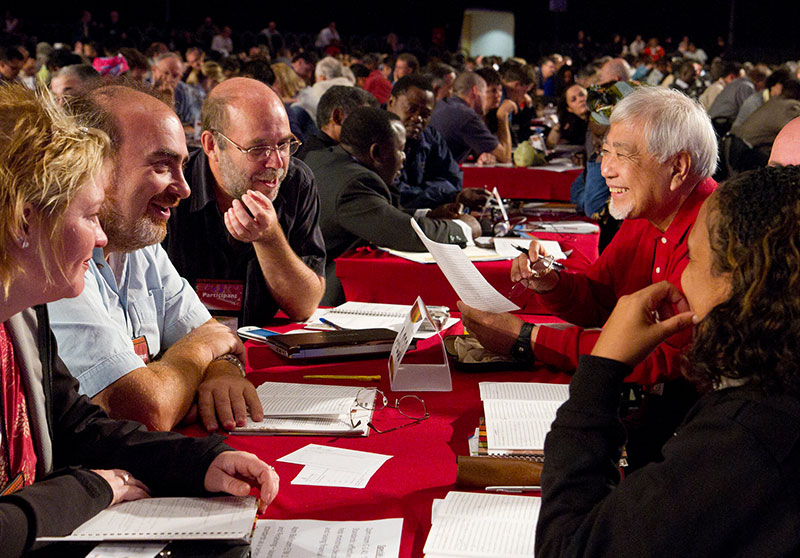
Connection Leads to School Accreditation
‘My wife and I had been running a music and worship training school in the UK for 12 years prior to Cape Town 2010 [and] it remained unaccredited due to peculiarities in the British academic system. I had been wanting to connect with Trevor Sampson, one of the [accrediting] worship directors for many years. I decided to go to a seminar he was running in the hope of catching up.
‘The venue changed at the last minute and on the way to the new room, I found myself walking next to Trevor. He saw my name badge which said, “Coventry, UK”. He says, “Oh, Coventry. There is a worship school there I have been wanting to connect with for years. Do you know it?” At which point I said, “I started that school and I’ve been wanting to connect with you, too.” We had coffee that night and talked for three hours. Trevor set me up with a friend in London who arranged the accreditation of our degree programme, something that had remained stuck for years. Clearly a God-ordained appointment that happened “outside” of the programme timetable.’

IV. Collaboration/Partnerships
‘We feel a great sense of indebtedness to Lausanne and its ability to convene the world, to build on big ideas to make a big difference.’

Survey statement: ‘Through Cape Town 2010, I entered into a collaborative partnership with another/other Christian leader/s which led to greater ministry fruitfulness, launch of a new ministry, or business as mission.’ 70% of responders agreed (39%) or strongly agreed (31%) with this statement.
Some of the greatest impacts of Cape Town 2010 have occurred because of the catalytic collaborations among participants. An astounding 70% of responders said they entered into a collaborative partnership as a result of the gathering, many with another Cape Town 2010 participant.
Serbia and India Benefit Each Other
‘I met a leader from India, who is running a Bible seminary there, similar to the ministry that I’m leading in Serbia. We became great friends and coworkers. I have been to India to teach a couple of times, along with some teachers from our seminary. Soon, we will host a leader from India here in Serbia. Our relationship has brought so many blessings to us and to our ministry. Praise God!’
Table Group Keeps Expanding
‘I met many wonderful servant leaders and continue to keep in touch with my table. Cape Town 2010 also enabled me to introduce several key global leaders who are friends of mine to each other. In January 2015 I hosted a weeklong gathering at my home for these servant leaders from different countries as well as other kingdom-minded leaders, and we started a liquid network, assisting one another in global work among unreached peoples, integrating various areas of expertise, and continuing to gather for a week each January. Attendees have now started another chapter in the Mediterranean region. Cape Town 2010 was crucial to God developing this!’
Inner City Church Finds Mission Opportunities
‘Uptown Baptist Church in inner city Chicago collaborated with Princess Kasune Zulu, one of Cape Town’s keynote speakers, and Fountain of Life in Zambia to deliver the good news, medical supplies, and fresh water in the villages of Zambia. We have since adopted the Zaramo people group in Tanzania and made multiple mission trips to the villages to bring the gospel of Jesus Christ. We successfully planted two village churches under the leadership of IMB missionaries. To God be all the glory!’
Orthodox Initiative
‘At Cape Town 2010 a small number of evangelical leaders met with some of the Orthodox observers present, resulting in the birth of the Lausanne Orthodox Initiative. Ten years later we have grown into a global network of Orthodox and evangelical leaders who seek to encourage and strengthen each other in the mission of God. We have had regular consultations, undertaken projects together, and are just about to publish our second book.’
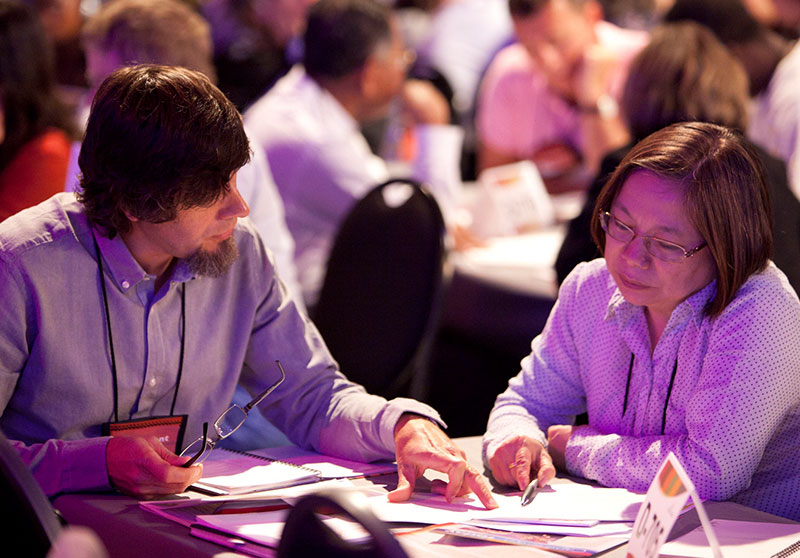
Existing Networks Improved/Expanded
Several Lausanne issue networks experienced a turning point at Cape Town 2010 and have continued to expand ever since.
Tim Keller, Bob Doll, and Mac Pier, all three Cape Town 2010 participants, met over two breakfasts during the gathering. These meals led them to partner together as a pastor, a marketplace leader, and a non-profit expert—the kind of partnership they believed was the key to the acceleration of the gospel in New York City. From their collaboration in Cape Town, Movement Day, which serves as the Lausanne Movement’s network on cities, was accelerated into a global movement. The exponential growth has led to 2,000 participants from 900 cities gathering for the recent 10th anniversary virtual event.
Before 2010, the streams of Bible translation and Scripture engagement were often seen as separate entities. At Cape Town, however, these two streams came together under the common theme of eradicating Bible poverty. This partnership between translation and engagement has led to the blossoming of both endeavors. Translation has gone from a largely Western project to a truly global one, with people from over 100 nations working on translations for over 2,007 languages. And the energy from Cape Town 2010 has fueled a growing movement for Scripture engagement in the world. Today the two streams are united under the Scripture Engagement Network .
In similar ways, the Business as Mission, Integral Mission, and International Student Ministry issue networks are among the many networks that saw concrete and exciting growth due to the connections made at Cape Town 2010.

V. Impact of Participants on Others
‘After the inerrant Word of God (the Bible), The Cape Town Commitment is the foundation upon which our ministry’s values and principles are drawn.’

Survey statement: ‘Since Cape Town 2010, I have used what I learned to train, mentor, or coach another/other Christian/s.’ 88% of responders agree (46.3%) or strongly agree (41.3%) with this statement.
In seminaries, universities, churches, consultations, hospitals, and countless other settings, Cape Town 2010 participants took what they learned and put it into practice, educating others in mentorship, training, and coaching.
The Cape Town Commitment has been one of the most impactful documents to come out of the gathering. It has not only served as the roadmap for the Lausanne Movement for the past 10 years, but continues to influence seminary education, mission sending agencies, and other ministries.
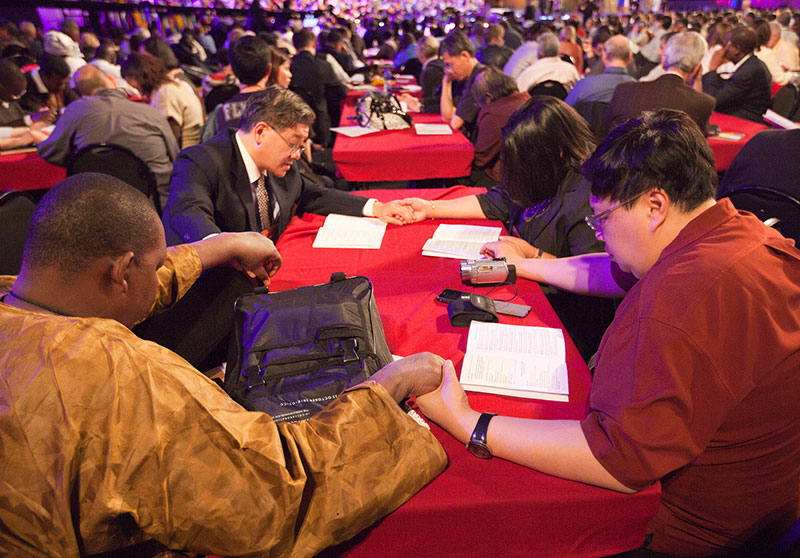
A. Training, Mentoring, Coaching
‘I used what I learned at Cape Town to teach my staff here at Korean Mission General Hospital.’
‘The Ephesians study [at Cape Town 2010] dramatically changed the way I learn Scripture, and I encourage the same for those in my ministry now.’
B. Ongoing Impact of The Cape Town Commitment
Academics
‘I started to teach Business as Mission in seminary a few years ago based on the insights and materials I received at Cape Town. The Cape Town Commitment is the essential document in all my missiological courses.’
Exponential Growth in Leadership Development Effectiveness
‘Up to 2010, we had focused on leadership development, but found that apart from learners genuinely confessing their belief and adherence to the principles and values, the trained leaders did not show a solid capacity to change their patterns in personal life and ministry. At Cape Town 2010 it was the connection between leadership built on a sound discipleship basis that made us stumble over a key value for our future ministry. We have focused since about three-quarters of our ministry efforts on the personal spiritual/character development of Christian leaders. The remaining quarter deals with aspects of leadership development. And the results are rampant: the leaders and the impact they have are growing through the roof.’

VI. Conclusion
These stories and quotes are only a representative sample of the hundreds of positive comments generated by the survey. In summary, Cape Town 2010 moved the global church forward in fulfilling its mission by:
- Changing the perspectives and attitudes of many global mission leaders
- Launching new ministries of evangelism and discipleship
- Connecting influencers and ideas for global mission
- Fostering partnerships and collaborative initiatives among global mission leaders
- Encouraging cross-disciplinary cooperation for innovative and creative solutions
- Indirectly generating hundreds of millions of dollars for missions
- Creating The Cape Town Commitment
To God be the glory for all he has done through Cape Town 2010—for all those who participated in the gathering, and all who made it possible through their generous kingdom investment.
